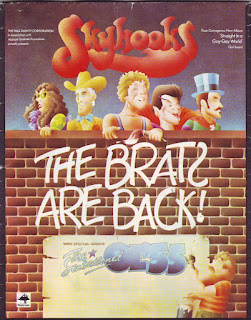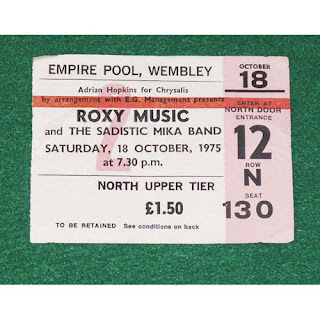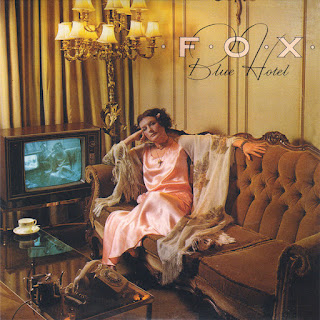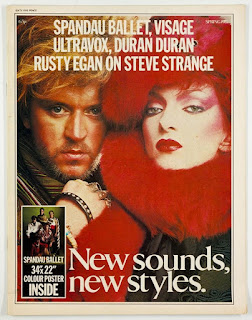Vicious, interviewed by Vermorels, on Who Killed Bambi, Russ Meyer, The Great Rock'n'Roll Swindle etc
a book about glam rock and art pop - 1970s mostly - but also tracking its echoes and reflections through the 80s, 90s and into the 21st Century - footnotes to follow here soon
Sunday, September 26, 2021
A Star Is Torn (Vicious's anti-theatricality)
Friday, September 24, 2021
Electrifying
I appeared as a "grinning English expert" myself in this NPR item on the 50th anniversary of Electric Warrior - alongside the voices of Joe Elliott from Def Leppard, Tony Visconti and Mark the magician himself.
It is a near-perfect dream of a record, marred by only one dud
Saturday, September 18, 2021
A Star is Born (Lydon's anti-theatricality)
“I got the name Public Image from a book by that Scottish woman, Muriel Spark, who wrote ‘Prime of Miss Jean Brodie’. When I was in Italy, somebody introduced her writings to me. I checked out some of her other books when I got home. One of them was called ‘The Public Image’. It was all about this actress who was unbearably egotistical. I though, Ha! The Public Image. Limited. Not as a company, but to be limited – not being as ‘out there’ as I was with the Sex Pistols.” - John Lydon
"I love books. I love the texture, the feeling, everything about them. Especially the way the words come alive in my mind. A beautiful turn of phrase can really affect me. It lets my mind wander around inside of somebody else's.... Some books, like where I took the name for Public Image, from Muriel Spark, called The Public Image, it was just a cheap little small book. But it's just, to my mind, a very well-told story about corruption and how industry can rot your brain if you're not careful. It's a good reminder. I got a good sense of grounding from it, and I also got the name for the band. Success! And I don't think that book cost me more than a pound in a junk store." - John Lydon
"Out of all the fascinating alternate takes, B-sides, rare compilation-only tracks and never-before-released sketches that comprise this expanded reissue of Public Image Ltd’s post-punk landmark, it’s a live version of “Public Image” that is the real revelation. Part of an impromptu June 1979 concert in Manchester, the song keeps collapsing and restarting. “Shut up!” snaps John Lydon, responding to audience jeers. “I told you it’s a fucking rehearsal.” Another PiL member explains that the drummer, Richard Dudanski, only joined three days ago. PiL relaunch the song only for Lydon to halt it with “Miles too fast!” The jeers erupt again and the singer offers a sort of defiant apology: if the crowd really wanted to “see mega light displays and all that shit,” they should go watch properly professional bands who put on a slick show. “But we ain’t like that... We’re extremely honest: sorry about that... We admit our mistakes.”
This performance—an inadvertent deconstruction of performance itself—takes us to the heart of the PiL project as well as the post-punk movement for which the group served as figureheads. At its core was a belief in radical honesty: faith in the expressive power of words, singing and sound as vehicles for urgent communication. After the Sex Pistols’ implosion, Lydon was trying to find a way to be a public figure again without masks, barriers, routines, or constraining expectations. So it’s especially apt that “Public Image”—PiL’s debut single, Lydon’s post-Pistols mission-statement—is the song that fell apart at Manchester’s Factory Club. “Public Image” is about the way a stage persona can become a lie that a performer is forced to live out in perpetuity. Lydon sings about “Johnny Rotten” as a theatrical role that trapped him and which he’s now casting off. Starting all over with his given name and a new set of musical accomplices, Lydon was determined to stay true to himself. The group’s name came from Muriel Sparks’ novel The Public Image, about a movie actress whose career is ruined but who, the ending hints, is freed to embark on an authentic post-fame existence. Lydon added the “limited” to signify both the idea of the rock group as a corporation (in the business of image-construction) and the idea of keeping egos on a tight leash.
"A comparison for Lydon’s search for a new true music—and a truly new music—that would leave behind rock’s calcified conventions is Berlin-era Bowie’s post-glam quest for a “new music night and day” (the working title of Low). Indeed it was Virgin Records’ belief that Lydon was the most significant British rock artist since Bowie that caused them to extend PiL such extraordinary license and largesse when it came to recording in expensive studios. That indulgence enabled the recording of three of the most out-there albums ever released by a major label..."
- SR, review of Metal Box reissue for Pitchfork
Hello. Hello. Hello. Hello. Hello. Hello.
You never listen to word that I said
You only seen me
For the clothes that I wear
Or did the interest go so much deeper
It must have been
The colour of my hair.
What you wanted was never made clear
Behind the image was ignorance and fear
You hide behind his public machine
Still follow the same old scheme.
Two sides to every story
Somebody had to stop me
I'm not the same as when I began
I will not be treated as property.
Two sides to every story
Somebody had to stop me
I'm not the same as when I began
It's not a game of Monopoly.
Public image you got what you wanted
The Public Image belongs to me
It's my entrance
My own creation
My grand finale
My goodbye
Public image.
Goodbye.
Sunday, September 5, 2021
mirroring mirrors mirrored
https://www.gartenbergmedia.
(via Andrew Parker)
"Being imbedded in this huge crystalline structure that has no top, bottom, or sides, this feeling of suspension, this feeling of polite claustrophobia or acrophobia, this feeling of fakery or loneliness seems complex, associatively enveloping and valid to me as a work of art, wonder, sensuality, pessimistic theory, and partial invisibility."
- Lucas Samaras
Thursday, September 2, 2021
wintertime for Hitler (anti-theatricality 6 of ??)
" Trump is an increasingly symbolic figure — Norma Desmond with the nuclear codes and sycophantic butlers in his ears on a West Wing ...








































































































































































